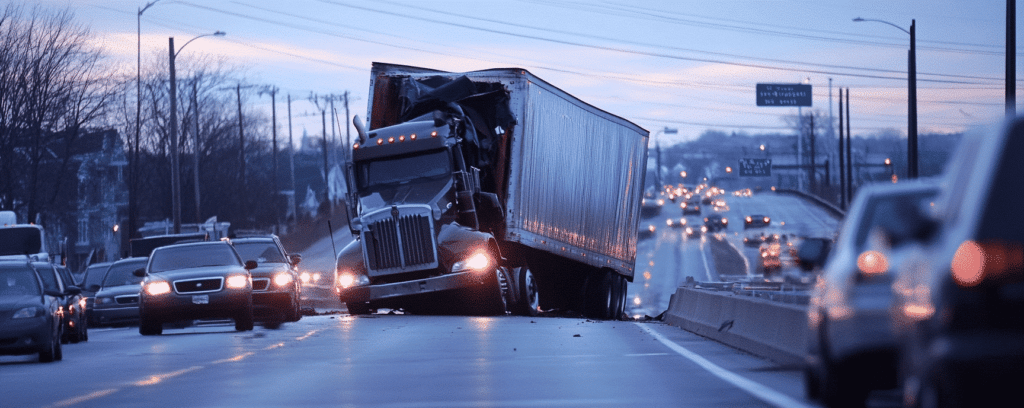Jackknife Accident Lawyer in Connecticut: Get Expert Help Now
Last updated Monday, November 18th, 2024

Involved in a jackknife accident in Connecticut? A specialized jackknife accident lawyer in Connecticut can help you understand your rights, navigate legal complexities, and obtain fair compensation. This article outlines what a jackknife accident lawyer can do for you and the steps to take after the accident.
Key Takeaways
- Jackknife accidents involve a truck’s trailer swinging out, often leading to multi-car pileups and severe injuries, and are primarily caused by factors like speeding, abrupt lane changes, and cargo shifts.
- Determining liability in jackknife accidents can be complex, involving the truck driver, their employer, and potentially other drivers or municipalities, necessitating thorough investigation.
- Victims of jackknife accidents can seek compensation for medical expenses, lost wages, and psychological trauma, making legal representation crucial for navigating claims and negotiating with insurance companies.

Get Your FREE Case Review,
In Person or Virtually Online
Understanding Jackknife Accidents in Connecticut
A jackknife accident occurs when a truck’s trailer swings out to the side, creating an angle similar to a folding pocket knife, effectively blocking the roadway and causing the vehicle to skid. These accidents are not only spectacular but also incredibly dangerous, often leading to multi-car pileups and severe injuries.
Several factors can contribute to a jackknife truck accident. Speeding, abrupt lane changes, and unsuitable driving speeds are the primary causes. Additionally, the truck’s cargo might shift unexpectedly, or the driver might be distracted or operating under the influence. These elements increase the likelihood of losing traction, particularly on curves or during sudden stops.
The impact of jackknife accidents extends beyond the initial collision. The skidding trailer can obstruct multiple lanes, causing secondary accidents with other vehicles. The sheer size and weight of these tanker trucks mean that accidents involving them can be fatal and lead to intense damage. Understanding these risks underscores the importance of adhering to safety regulations and being vigilant on the roads.
Legal Implications of a Jackknife Accident
Determining liability in a jackknife accident can be complex. Typically, the truck driver and their employer may be held responsible if negligence is proven. This could include actions such as speeding, driving under the influence, or failing to maintain the vehicle properly. However, liability does not always rest solely on the truck driver.
In certain cases, other drivers involved in car accidents may share some responsibility if their actions contributed to the incident. For example, if a car abruptly cuts in front of a truck, causing the driver to brake suddenly, this could lead to a jackknife situation. Additionally, municipalities might be held liable if poor road conditions or inadequate signage played a role.
The process of determining liability often involves intricate investigations. Multiple parties, including independent contractors and trucking companies, may be examined to establish fault. Understanding these legal nuances is crucial for accident victims seeking justice and compensation for their losses.
Common Injuries from Jackknife Truck Accidents

Spinal cord injuries are another significant concern, often leading to paralysis and other debilitating conditions.
The force of the impact can cause broken bones, affecting limbs, ribs, and the pelvis, which can require extensive recovery periods and rehabilitation. Internal injuries are also prevalent, with the potential to damage vital organs like the liver and kidneys. Besides these physical injuries, psychological trauma is a frequent aftermath.
Survivors of such accidents often endure PTSD, anxiety, and depression.
These psychological effects can be just as debilitating as physical injuries, necessitating comprehensive treatment.
Victims should also be aware that they may seek compensation for both physical and psychological damages.

Get Your FREE Case Review,
In Person or Virtually Online
Steps to Take After a Jackknife Truck Accident
In the immediate aftermath of a jackknife truck accident, safety is paramount. The first step is to call emergency services to report the accident and any injuries sustained. Ensuring that everyone is safe and receiving the necessary medical attention is critical. If possible, move to a secure location away from traffic.
Documenting the accident scene is equally important. Take photos of the vehicles involved, the surrounding area, and any visible injuries. This evidence can be invaluable when filing a claim or seeking legal advice. Additionally, gather contact information from all parties involved and any witnesses.
Avoid communicating with insurance adjusters from the trucking company without legal representation. Truck accident lawyers and tanker truck accident attorneys can help gather evidence and witness testimonies, providing the support needed to navigate the complexities of your case.
Pursuing Compensation for Jackknife Accident Victims
Victims of jackknife accidents have the right to seek compensation for their losses. This includes medical expenses, lost wages, property damage, and pain and suffering. Medical bills can quickly accumulate, and future medical expenses may be necessary for ongoing treatment. Compensation can help alleviate these financial burdens.
A specialized truck accident lawyer and tanker truck accident lawyer play a crucial role in negotiating with insurance companies. These professionals can effectively prove negligence and hold the liable parties accountable. Legal representation helps victims receive fair settlements, covering both past and future income losses due to the accident.
The aftermath of a jackknife crash often involves substantial emotional and financial damages. Compensation for pain and suffering, as well as the loss of quality of life, is essential for recovery. A skilled lawyer can navigate these claims, providing the support needed to pursue justice and financial relief.
The Role of a Jackknife Accident Lawyer in Connecticut
Prompt consultation with a truck accident attorney is vital due to the complexities involved in jackknife accidents. These legal professionals aim to create transparent communication channels, ensuring that clients are kept informed about their case’s progress.
Following the initial consultation, the lawyer will handle negotiations with the insurance company on the client’s behalf. If a settlement cannot be reached, the attorney is prepared to advocate for the client in court, fighting for the compensation they deserve.
Connecticut’s Statute of Limitations for Personal Injury Claims
In Connecticut, personal injury claims due to negligence or recklessness must generally be filed within two years from the date the injury is sustained or discovered. This timeline ensures that victims act promptly to secure their rights.
For medical malpractice cases, the statute allows up to three years to file a lawsuit, but claims must be initiated within two years of discovering the injury. Wrongful death claims in Connecticut have a two-year limit from the date of death, with a maximum of five years from the negligent act.
Product liability cases typically have a three-year deadline for filing a lawsuit. Accident victims must be aware of these timelines to seek justice and compensation effectively.
Free Consultation: What to Expect
Many law firms offer free consultations to jackknife accident victims, providing an opportunity to understand their legal rights and options without obligation. During the consultation, clients will receive a basic overview of their case and discuss potential legal strategies. The process allows clients to ask questions and clarify any doubts.
Arranging a consultation is straightforward. Potential clients can call the firm or visit the contact page to schedule an appointment. This initial meeting is crucial for building a strong legal foundation and ensuring that victims receive the support they need.
Frequently Asked Questions
What is a jackknife accident?
A jackknife accident is a type of collision where a truck’s trailer swings out at an angle to the cab, which can result in significant road obstructions and potentially severe multi-vehicle accidents.
Who can be held liable in a jackknife accident?
In a jackknife accident, liability may be attributed to the truck driver, their employer, other drivers involved, or municipalities if hazardous road conditions played a role. It is essential to assess all contributing factors to determine responsibility accurately.
What types of injuries are common in jackknife truck accidents?
In jackknife truck accidents, common injuries include traumatic brain injuries, spinal cord injuries, broken bones, internal injuries, lacerations, and psychological trauma. It is crucial to be aware of these potential injuries for better prevention and safety measures.
What should I do immediately after a jackknife truck accident?
Immediately after a jackknife truck accident, you should call emergency services, document the scene, and gather contact information from witnesses. It is also advisable to avoid conversing with insurance adjusters without legal representation.
How long do I have to file a personal injury claim in Connecticut?
You generally have two years from the date of the injury to file a personal injury claim in Connecticut. It is essential to adhere to this timeframe to preserve your right to seek compensation.

